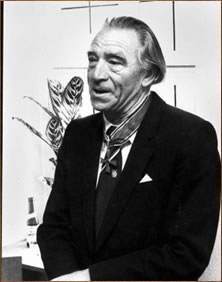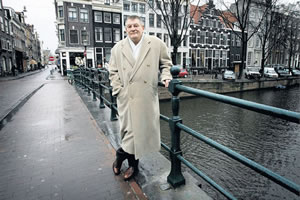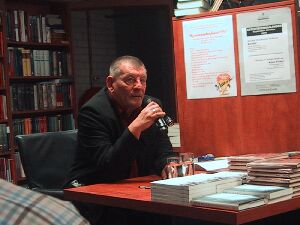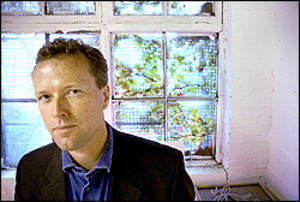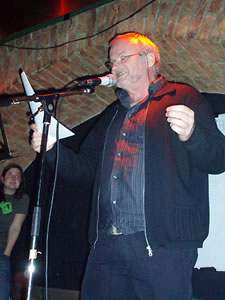De Nederlandse schrijver en dichter J. Bernlef werd geboren op 14 januari 1937 in Sint Pancras. Zie ook alle tags voor J. Bernlef op dit blog.
Prachtig
Beroemd maar dood vroeg hij: en
wat bleef er van mij over?
Ik wees op een losse regel
een uit zijn verband gerukt citaat
meestal toegeschreven aan een ander.
Voetafdruk op een verlaten strand
vol lege, uitgewoonde schelpen.
Prachtig is de onsterfelijkheid
maar wat doen wij in de tussentijd?
*
Tule, riet, papier, taf,
gaas, bombazijn, maar
Leonardo’s vleugels vlogen niet
Engelen bestaan in gedichten
of op schilderijen waar zij
roerloos in beweging zijn.
Hij maakte de mens open
hij maakte de vogel open
vergeleek en zag dat het niet kon.
En toch; tule, riet, papier, taf,
gaas, bombazijn dat door zijn vingers glijdt
zijn vingers die een schaduw
laten vliegen op de muur.
Transparant
Hoe fragiel ons denkwerk
(hoe simpel uit te halen niet)
Tot wij volkomen in de war
de wereld ondergaan zoals zij is
voordat wij er waren.
Er zijn.
Wat anders dan
staren door mazen?
O, oogverblindend kind
dat zingend alles verbindt
met van licht trillende vingers.
J. Bernlef (Sint Pancras, 14 januari 1937)
De Japanse schrijver Yukio Mishima werd geboren op 14 januari 1925 in Tokyo. Zie ook ook alle tags voor Yukio Mishima op dit blog.
Uit: Une histoire sur un promontoire
Pouvait-on imaginer un paysage aussi élégant qui fût à ce point chargé de mélancolie? On n’apercevait ça et là rien que des bosquets de pins et d’arbustes. D’innombrables petits reliefs transformaient cette montée en suite de lacets, et il aurait été impossible de dire le nombre de villas qu’on entrevoyait entre les bois et les rochers […]
Ce secret d’une subtile configuration semblait conférer à ce magnifique paysage du promontoire encore plus de mystérieuse et érémitique beauté. L’habitant d’une des villas devait finir par croire qu’il n’y avait ni maison ni âme qui vive à plusieurs lieues à la ronde, jusqu’au jour où, au détour d’une promenade, il tomberait, tout près de chez lui, sur une roseraie d’un charme enchanteur, devant une petite maison, et il ne voudrait pas en croire ses yeux; s’il touchait une fleur, aussi bien le diapré de la couleur rose et moite, que l’ombre nette se découpant sur les feuilles vertes prouverait la réalité des roses, et, dans sa stupeur, il verrait des volets s’ouvrir, avec un grincement de loquet, et leurs ombres courir, puis, apparaissant à la fenêtre, l’habitant des lieux lui adresser un salut amical… la sensation d’étrangeté atteindrait alors à son comble. Sur ce promontoire, dix ou vingt minutes de promenade suffisaient pour pénétrer dans un univers de conte de fées et pour en ressortir.

Yukio Mishima (14 januari 1925 – 25 november 1970)
De Amerikaanse schrijver John Dos Passos werd geboren op 14 januari 1896 in Chicago. Zie ook alle tags voor John Dos Passos op dit blog.
Uit: Three Soldiers
„The company stood at attention, each man looking straight before him at the empty parade ground, where the cinder piles showed purple with evening. On the wind that smelt of barracks and disinfectant there was a faint greasiness of food cooking.
At the other side of the wide field long lines of men shuffled slowly into the narrow wooden shanty that was the mess hall. Chins down, chests out, legs twitching and tired from the afternoon’s drilling, the company stood at attention. Each man stared straight in front of him, some vacantly with resignation, some trying to amuse themselves by noting minutely every object in their field of vision,—the cinder piles, the long shadows of the barracks and mess halls where they could see men standing about, spitting, smoking, leaning against clapboard walls. Some of the men in line could hear their watches ticking in their pockets.
Someone moved, his feet making a crunching
noise in the cinders.
The sergeant’s voice snarled out: “You men are at attention. Quit yer wrigglin’ there, you!”
The men nearest the offender looked at him out of the corners of their eyes.
Two officers, far out on the parade ground, were coming towards them. By their gestures and the way they walked, the men at attention could see that they were chatting about something that amused them. One of the officers laughed boyishly, turned away and walkedslowly back across the parade ground. The other, who was the lieutenant, came towards them smiling. As he approached his company, the smile left his lips and he advanced his chin, walking with heavy precise steps.“

John Dos Passos (14 januari 1896 – 28 september 1970)
De Britse schrijver en journalist Edward St Aubyn werd geboren op 14 januari 1960 in Cornwall in een adelijke familie. Door zijn vader werd hij jarenlang mishandeld en sexueel misbruikt. Opgegroeid is hij in St Aubyn in Engeland en in het zuiden van Frankrijk. Hij bezocht de Westminster School en de universiteit van Oxford, Beroemd werd St Aubyn door de autobiografische romantrilogie Some Hope. Zijn zesde roman Mother’s Milk kwam in 2006 op de shortlist van de Booker Prize.
Uit: Mother’s Milk
“Why had they pretended to kill him when he was born? Keeping him awake for days, banging his head again and again against a closed cervix; twisting the cord around his throat and throttling him; chomping through his mother’s abdomen with cold shears; clamping his head and wrenching his neck from side to side; dragging him out of his home and hitting him; shining lights in his eyes and doing experiments; taking him away from his mother while she lay on the table, half-dead. Maybe the idea was to destroy his nostalgia for the old world. First the confinement to make him hungry for space, then pretending to kill him so that he would be grateful for the space when he got it, even this loud desert, with only the bandages of his mother’s arms to wrap around him, never the whole thing again, the whole warm thing all around him, being everything. The curtains were breathing light into their hospital room. Swelling from the hot afternoon, and then flopping back against the French windows, easing the glare outside. Someone opened the door and the curtains leaped up and rippled their edges; loose paper rustled, the room whitened, and the shudder of the road works grew a little louder. Then the door clunked and the curtains sighed and the room dimmed. “Oh, no, not more flowers,” said his mother. He could see everything through the transparent walls of his fish tank crib. He was looked over by the sticky eye of a splayed lily. Sometimes the breeze blew the peppery smell of freesias over him and he wanted to sneeze it away. On his mother’s nightgown spots of blood mingled with streaks of dark-orange pollen. “It’s so nice of people…” she was laughing from weakness and frustration. “I mean, is there any room in the bath?” “Not really, you’ve got the roses in there already and the other things.” “Oh, God, I can’t bear it. Hundreds of flowers have been cut down and squeezed into these white vases, just to make us happy.” She couldn’t stop laughing. There were tears running down her face. “They should have been left where they were, in a garden somewhere.”
The nurse looked at the chart. “
Edward St Aubyn (Cornwall, 14 januari 1960)
De Chinese schrijfster Anchee Min werd geboren in Shanghai op 14 januari 1957. In 1976 werd Anchee Min gerekruteerd om in een propagandafilm van de Shanghai Film Studio de rol van mevrouw Mao te spelen. Anchee Min woont sinds 1984 in de Verenigde Staten. Van Rode Azalea -het autobiografische relaas van haar jeugd in communistisch China- werden de rechten verkocht aan twintig landen. Daarna verschenen haar succesvolle romans Mevrouw Mao en Wilde Gember.
Uit: Becoming Madame Mao
„Can’t you lift a finger? the mother yells. It’s my last wish, for heaven’s sake!
Save me, Nah. Any day a bullet will be put into my head. Can you picture it? Don’t you see that there has been a conspiracy against me? Do you remember the morning when Deng Xiao-ping came to your father’s funeral and what he did? He just brushed fingers with me – didn’t even bother to shake my hand. It was as if he questioned that I was Mao’s widow. He was aware of the cameras – he purposely let the journalists catch the scene. And the other one, Marshal Ye Jian-ying. He walked past me wearing an expression as if I had murdered the Chairman myself!
Your father warned me about his comrades. But he didn’t do anything to protect me. He could be heartless. His face had a vindictive glow when he made that prediction. He was jealous that I got to go on living. He would have liked to see me buried with him, like the old emperors did with their concubines. One should never have delusions about your father. It took me thirty-eight years to figure out that sly fox. He could never keep his hands away from deception. He couldn’t survive a day without trickery. I had seen ghosts in his eyes stretching out their claws. A living god. The omniscient Mao. Full-of-mice-shit.“
Anchee Min (Shanghai, 14 januari 1957)
De Amerikaanse schrijfster Mary Robison werd geboren op 14 januari 1949 in Washington D.C. Zij studeerde aan de Johns Hopkins University. Zij publiceerde al vier verhalenbundels en drie romans, waaronder Why Did I Ever waarvoor zij in 2001 de Los Angeles Times Book Prize for fiction kreeg.
Uit: Why Did I Ever?
10
The name I use is an annoying problem. Everyone wonders about it. No one doesn’t ask.
My name is Money. I picked it up and kept it and now it’s what I’m called.
I say I’m tired of telling how I got the name. Or that the story isn’t all that great.
Still Something Missing
“I need plywood,” said my son, Paulie, in his sleep. Or I heard wrong. I know it was “need” something.
That was my first day there, at his flat on St. Anne, before NYPD began hiding him.
He looked like this: in white cotton socks and frayed blue jeans, a cowhide belt and a petal-green sweater. His hands in their horrible bandage gloves must’ve been on his lap and I couldn’t see them because he was bent over, with his plate pushed aside and his face on the dining table, and he was all-the-way asleep, with a tiny chip of emerald glinting there in the lobe of his ear.
12
Days went by and he still kept ignoring all the stuff I’d brought for him. Fine stuff, but Paulie couldn’t get in the mood. And he was in something like pain when I finally set each thing out and presented it as though it were for sale. What, could’ve been wrong with me? Handkerchiefs! I told him about the quality. “Just wait’ll you go to use one of these.” He was three weeks out of the hospital. I should have ground the things up into bits and shreds in the garbage disposal.
A World of Love
I’m a script doctor, as far as I know this afternoon at three o’clock central time. And I’m due back at the studio according to Belinda who’s the development producer or whatever is her job.
She has some hair shirt or other laid out for me.
Belinda is not warm. She’s small-minded, mean, picky-petty.
Someday I will learn kickboxing and I will show up at Mercury Brothers and kickbox the stuffings out of her“
Mary Robison (Washington, 14 januari 1949)
De Oostenrijkse dichter en schrijver, musicus en cabaretier Martin Auer werd geboren op 14 januari 1951 in Wenen. Van 1971 toto 1977 werkte hij als dramaturg, acteur en musicus aan het Theater im Künstlerhaus in Wenen. Daarna werd hij zelfstandig schrijver en songwriter. Bovendien was hij enige tiijd werkzaam als journalist en in de reclamebranche.
Ich bin eine Nixe, sagt sie
o Mann, o Mann!
Ich bin eine Nixe, sagt sie,
ich kann nicht ertrinken.
Aber immer, wenn ich Goldfische seh,
wird mir ganz furchtbar schlecht.
Und vielleicht bricht morgen der Frieden aus,
dann gehn wir ganz groß einen saufen.
Und vielleicht bricht er nicht aus,
aber das erfahrn wir dann schon.
Ich bin eine Nixe, sagt sie,
ich komm durch die Wasserleitung.
Meine Familie zog aus dem Süden
herauf in die Stadt.
Meine Familie wohnt in einem
Aufzug im achtzehnten Postbezirk.
wenn sie beim Frühstück sitzen,
tunkt immer der Zahnarzt aus dem zwölften Stock
seinen Mantel in ihren Kaffee.
Und sie sagt:
O Mann, o Mann, o Mann,
wie ich dich liebe!
Und sie sagt:
o Mann, o Mann, o Mann,
o Mann, o Mann!
Und im Stadtpark ist es so hell heut,
die Luft ist wie Silber.
Und Baby kriegt Eiskrem
und bekommt einen Erstickungsanfall.
Und eine kleine fliegende Kamera
macht Fotos von uns mit rosa Schleifchen.
Und der Brezelmann geht Pleite
vor unsern Augen.
Und sie sagt:
O Mann, o Mann, o Mann,
wie ich dich liebe!
Und sie sagt:
o Mann, o Mann, o Mann,
o Mann, o Mann!
Das sind vielleicht herrliche Zeiten, sagt sie,
für alles gibt es Gratisgutscheine.
Und gestern hab ich mich versichern lassen
gegen Todesangst und Melancholie.
Und alle haben jetzt Telefon im Auto,
eine Kreditkarte und eine Versicherungsnummer.
Und sogar die Polizisten
tragen Lebkuchenherzen im Haar.
Und sie sagt:
O Mann, o Mann, o Mann,
wie ich dich liebe!
Und sie sagt:
o Mann, o Mann, o Mann,
Martin Auer (Wenen,14 januari 1951)
De Poolse schrijver Marek Hlasko werd geboren op 14 januari 1934 in Warschau. Hij had allerlei baantjes tot hij in 1955 groot opzien baarde met zijn eerste verhalen. Zijn schokkende taalgebruik maakte van hem de woordvoerder van een hele generatie. Van 1955 tot 1957 was hij redacteur van het weekblad “Po Prostu” , waarin de toonaangevende intelligentia publiceerde. In 1958 reisde hij naar Westeuropa. Toen zijn visum niet verlengd werd keerde hij niet naar Polen terug. Hij stierf al op 35-jarige leeftijd aan een overdosis tabletten en alcohol in Wiesbaden.
Uit: Piekni dwudziestoletni / The Beautiful Twenty-Year Olds (1966)
“I have come to know many cunning people in my life: I have known those who sold sugar for morphine, the sellers of Persian carpets which were made two hours earlier in Tel-Aviv’s Ben-Jehuda Street; during the occupation I knew a guy who loaded himself with diamonds by selling flour to Jews and telling them it was poison that would save them from suffering when there was no way out … but I have never met a man as faultlessly cunning as Ford.
I think I can write so with confidence, for I know how many people, ideas and films this man has wasted, being most cunning and foxy opportunist who pretended to be most embittered and infuriated by the stupidity of the authorities. ‘Osmy dzien’ was a bad story, yet could have been turned into a good film. But you need to be able to make good films. Ford, who knows Warsaw only through his car windows, moved the plot to the Old Town; Agnieszka wanders along sugary-sweet streets; those streets are filled with extras dressed in T shirts and pretending to be lumpenproletariat elements who accost her. The point of the story, which I unfortunately bungled, though I like its idea, was as follows: the girl who can see the grime and sleaze of it all wants only one thing for herself and her boyfriend – a beautiful start to their love. The idea of Ford’s film is that people have nowhere to fuck, which is obviously untrue, for you can fuck anywhere … The film was to win him a Cannes award, recognition by the Marxist critics [who had made a spectacular, adaptive conversion after the “breakthrough”] and subtle criticism from party authorities. It turned out a piece of shit – unluckily for Ford, but luckily for myself.“

Marek Hlasko (14 januari 1934 – 14 juni 1969)
De Joods-Amerikaanse schrijfster, dichteres en feministe Tillie Lerner Olsen werd geboren in Omaha (Nebraska) op 14 januari 1912. Olsen die een zeer linkse politieke overtuiging was toegedaan en onder meer allerlei vakbondsactiviteiten ondernam (ze kwam er zelfs een tijdje voor in de gevangenis), schreef over de beslommeringen van ‘gewone’ vrouwen en andere alledaagse sociale onderwerpen. Haar literaire werk diende tot inspiratie van diverse feministische schrijfsters. Alhoewel ze slechts weinig boeken heeft geschreven, worden het feministische “Tell Me a Riddle” uit 1961 (een bundel van vier korte verhalen) en het niet afgemaakte “Yonnondio: From the Thirties” uit 1974 (laatste gaat over de Grote Depressie) als klassieke meesterwerken beschouwd. Voor de eerste won ze de O. Henry Award.
i want you women up north to know
i want you women up north to know
how those dainty children’s dresses you buy
at macy’s, wannamakers, gimbels, marshall fields,
are dyed in blood, are stitched in wasting flesh,
down in San Antonio, “where sunshine spends the winter.”
i want you women up north to see
the obsequious smile, the salesladies trill
“exquisite work, madame, exquisite pleats”
vanish into a bloated face, ordering more dresses,
gouging the wages down,
dissolve into maria, ambrosa, catalina,
stitching these dresses from dawn to night,
in blood, in wasting flesh.
Tillie Olsen (14 januari 1912 – 1 januari 2007)
De Duitse dichter en schrijver Rudolf Hagelstange werd geboren op 14 januari 1912 in Nordhausen. Van 1931 tot 1933 studeerde hij filologie in Berlijn. In 1939 bezocht hij de Reichspresseschule. Tijdens WO II diende hij als inlichtingenofficier. In 1944 was hij oorlogsverslaggever in Frankrijk en Italië. Na de oorlog verscheen zijn eerste dichtbundel met 35 sonnetten: Venezianisches Credo. Behalve gedichten schreef hij ook essays en romans en was hij als uitgever werkzaam.
Uit: Venezianisches Credo.
Sonett 11
Wie faß ich ihn, den dreimal Hochgebauten,
den Alterslosen und Unbenennbaren!
Wo ist ein Wort, das seinen Urstand wahren
und seinen Glanz auffangen kann. Wir schauten
die Sterne an und wurden sein nicht inne;
und nicht des Mondes Strahl, der träumerische,
und nicht das Schuppenkleid der Fische
genügen ihm. Und der Gebirge Zinne,
die höchste, und des Adlers kühne Schwinge,
die Wolke und der Blitz – sie sind nur Blicke,
zu ihm gerichtet, ohne ihn zu sehn.
Er atmet aus den Winden, die ihm wehn,
und duftet aus der Rose, die ich pflücke,
Er ist die Melodie, nach der ich singe.
Rudolf Hagelstange (14 januari 1912 – 5 augustus 1984)
De Russische schrijver Anatoli Rybakov werd geboren op 14 januari 1911 in Tsjernihiv. Rybakov wijdde zich na de oorlog geheel aan de literatuur. De enige roman, die van hem in het Nederlands verscheen was ‘Het zware zand’ over het antisemitisme. ‘De kinderen van de Arbat’ betekende in de Sovjetunie een sensatie omdat dit grotendeels autobiografische werk een radicale afrekening met het stalinisme inhield. De Arbat is een bekende hoofdstraat in Moskou, waar enkele van de figuren uit het boek wonen. Het verhaal speelt in 1934 aan de vooravond van de grote politieke processen, waarbij bekende politieke leiders op instigatie van Stalin werden geliquideerd. Rybakov beschrijft het lot van een jonge student, die onschuldig in de gevangenis belandt en
later naar Siberië wordt verbannen. Opmerkelijk is, dat in deze roman Stalin zelf als een van de hoofdfiguren optreedt.
Uit: The Children of the Arbat
„Stalin put aside his book, got up, and paced around the room clutching his pipe. He stopped at the window and gazed out at the familiar sight of the yellow and white Arsenal building and the bronze cannons lined up along its facade.
The diplomat from Motovilikha! It wasn’t an unarmed Germany that posed a threat, it was Japanese troops in Manchuria, in our rear in the Far East. Budyagin knew that perfectly well, however limited his outlook. He hadn’t come to talk about Hitler.
He’d come to make it known that there were people in the Party who had their own point of view, and that they were defending their right to their point of view, and that at the proper time they would advance it against his point of view. Budyagin hadn’t come on his own initiative, he was too unimportant. He’d come on instructions from the same people who had allegedly helped him, Stalin, to rout his enemies, the same people he was supposed to rely on, and was relying on, because he had to, otherwise they’d get rid of him the way they’d got rid of the others. They thought he was indebted to them for everything.
They were profoundly misguided. The true leader emerges by himself, he owes his power to himself alone. Otherwise he is not a leader, but a puppet. They hadn’t chosen him, he had chosen them. They hadn’t pushed him to the front, he had pulled them along behind him. It wasn’t they who had helped him to consolidate himself, it was he who had raised them to the pinnacles of state power. They had become what they were solely because they had taken their places alongside him.“
Anatoli Rybakov (14 januari 1911 – 23 december 1998)
De Duitse dichter en schrijver Werner Helwig werd op 14 januari 1905 in Berlijn geboren. De toenmalige jeugdbeweging is van grote invloed op zijn werk geweest. Helwig behoorde tot de Nerother Wandervogel en bracht midden jaren twintig lang door op de burcht Waldeck, waar het landelijke centrum van de Wandervogel gevestigd was. Ook maakte hij jarenlang trektochten door Scaninavië, Ijsland, Ierland, Spanje en Griekenland. De oorlogsjaren bracht hij door in Liechtenstein, daarna woonde hij tot aan zijn dood in Genève.Internationaal bekend werd Helwig met het eerste deel van zijn Hellas-trilogie: Raubfischer in Hellas uit 1939.
Uit: Raubfischer in Hellas
„Ich gab nicht nach und hielt ihm entgegen, daß der Mensch, der in den Zentralen der Hochzivilisation lebe, sozusagen in der Urzelle seiner selbst bedroht sei. Die Luft sei nicht mehr in Ordnung, an den Nahrungsmitteln wirkten sich schädliche, kaum kontrollierbare Einflüsse aus, wegen der Übervölkerung nehme der Verkehr ständig zu. Man wisse nicht mehr, wohin das führen solle. Es sei keine Zukunft mehr da, der man geruhig und in Erwartung eines vergnüglichen Lebensabends entgegengedeihen könne. Man müsse von Moment zu Moment überleben und freue sich der erfochtenen Siege kaum. Denn schon wäre die nächste Sorge da und würde die Kraft von gestern und morgen zugleich verbrauchen. Er jedoch hätte sich in eine, wie er selbst dargestellt – Räubergesellschaft zurückgezogen, die sich, alles überspringend, an die Spitze des Vernichtungszuges gesetzt hätte, der, man wisse nicht wann, jedenfalls irgendwo im neunzehnten Jahrhundert, aufgebroc
hen sei, um der Welt die letzte ihrer Stunden aufzuzwingen. Was aber unternähme er, um diese Entwicklung zu stoppen? Während in den Städten Gegenmaßnahmen durchberaten und erprobt würden, hätten seine Freunde nichts Besseres im Sinn, als das Meer, die Lebensweide von einigen hunderttausend Wesen, lahmzulegen und der künftigen Weltverödung die ersten gelungenen Entwürfe zu liefern!

Werner Helwig (14 januari 1905 – 4 februari 1985)
De Finse dichter en schrijver Zacharias Topelius werd ggeboren in Nykarleby op 14 januari 1818. Topelius was zweedstalig, zoals destijds zovelen in de hogere maatschappelijke klassen, en hij schreef dan ook in het Zweeds. Wel zeer bijzonder in die tijd was dat hij het Fins ook goed beheerste. In 1831, op dertienjarige leeftijd, ging hij naar Helsinki, waar hij al snel in contact kwam met Johan Ludvig Runeberg, de belangrijkste Finse dichter van de 19e eeuw. Hij woonde zelfs enige tijd bij Runeberg thuis. Topelius haalde zijn eerste graad in 1840, en zijn licentiaat in 1844. In 1848 werd hij doctor in de filosofie. In 1854 werd hij benoemd tot rector de Universiteit van Helsinki. Ook gaf hij Geschiedenis, Zweeds en Statistiek op het lyceum van Helsinki. Van 1841 tot 1860 was hij tevens hoofdredacteur van de krant Helsingfors Gazette. Parallel aan zijn universitaire carrière hield Topelius zich bezig met literatuur. Hij was tamelijk veelzijdig; zo schreef hij honderden gedichten, sprookjes en liederen. Ook schreef hij het libretto voor de eerste Finse opera Kung Karls jakt (De jacht van koning Karel), alsmede de eerste Finse historische roman Hertiginnan af Finland (De Hertogin van Finland). Vandaag de dag worden vooral zijn sprookjes nog het meest gelezen.
Uit: The Birch and The Star
“I still know an old story about a boy and a girl who throughout their life only wanted to reach one single goal. How many of us could say the same? Nearly two hundred years ago there was a big distress in Finland. The war raged around the country, towns and houses were burnt, the fields were trod and hundreds of thousands of people died of sword, of hunger, in exile and of frightening diseases. Then neither seen nor heard nothing else but sighs and tears, moans, sorrow, pain and blood; and those who had any hope remaining, could no longer know what to wish for, as the plague of God crossed our country disciplining it strictly; those memories are never forgotten.
During this big distress many families were also divided so that a few were taken to the enemies’ country, others fled into the forests and woods or to far-away Sweden; the wife knew nothing any more about her husband, the brother about his sister and the father and the mother did not know about their children if they were still alive or already dead. That´s why, when peace came at last and those still being alive returned home, only sparse could not miss a relative nor cry.
It is told in a story of Knight Bluebeard that he sent his sister to the tower from which one could see far to the road and every little while was asking her: “Anna, my sister, do you see anyone coming ?” Likewise many asked each other when the cottage seemed gloomy and the dear ones did not arrive: “Is anybody coming?” And usually the answer was: “No one !”-But sometimes it happened as in the fairy-tale of Bluebeard that from far away a small dust cloud was seen on the road and at last a group of refugees who were lookig for their close relations was seen… „

Zacharias Topelius (14 januari 1818 – 12 maart 1898)
De Nederlandse dichter en schrijver Isaäc da Costa werd geboren in Amsterdam op 14 januari 1798. Zie ook mijn blog van 14 januari 2007.
Uit: Bezwaren tegen den geest der eeuw
„Verdraagzaamheid is mede een dier tooverwoorden, waarmede men het onnadenkende verstand van menig welmeenende begoochelt, en hem de verschriklijkste misbruiken onder den naam der heiligste deugden weet op te dringen; een dier leuzen, waarmede men een halve wereld te wapen roept, en ten strijde geleidt tegen alles wat aan de heerschzuchtige oogmerken van hen, die niets in den hemel noch op de aarde boven zich verdragen willen, den minsten tegenstand durft bieden. Zekerlijk noemen het de wolven verdraagzaamheid, wanneer de herders en de honden sluimeren, of zich sluimerend houden, en de schapen ten prooi
[p. 19]origineel laten aan het verscheurende gedierte, hetwelk zy verplicht waren van de kudde te weren en te verdrijven: en de bewoners van alle tucht en strafhuizen zouden het ongetwijfeld zeer verdraagzaam vinden, indien de Overheden de banden, waarin zy tot behoud der maatschappy wederhouden worden, goed vonden los te maken, en hun de vrije macht gaven om naar welgevallen te plonderen en te moorden. Zullen wy dit mede verdraagzaamheid heeten? Neen waarlijk! het staat niet in de macht, noch van weinigen, noch van velen, om door eene willekeurige en partydige naamgeving misbruiken en verkeerdheden tot deugden te heiligen.“
Isaäc da Costa (14 januari 1798 – 28 april 1860)
Zie voor onderstaande schrijfster ook mijn blog van 14 januari 2007.
De Duitse dichteres en strijdster voor vrouwenrechten Ida Dehmel werd geboren op 14 januari 1870 in Bingen.
